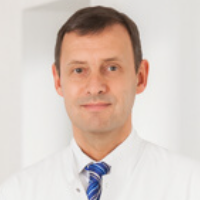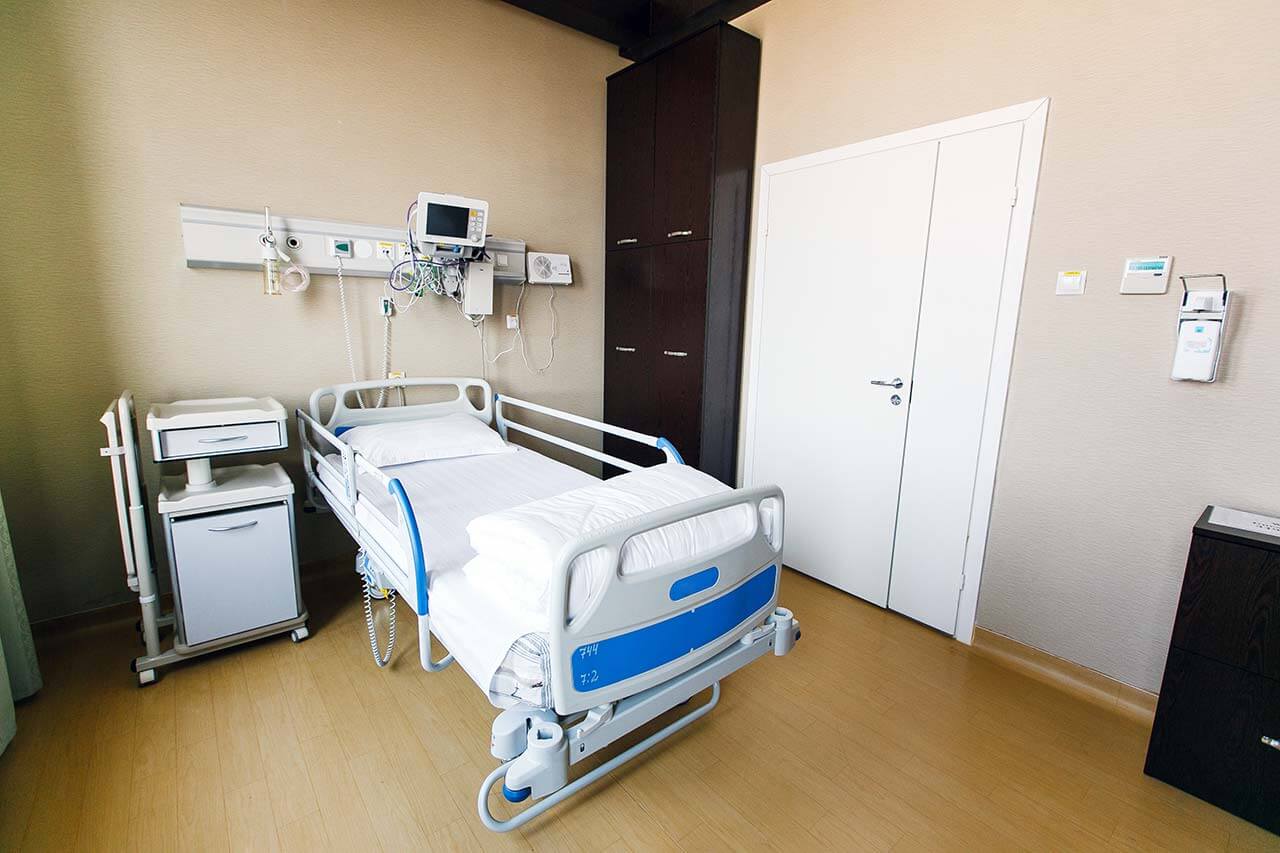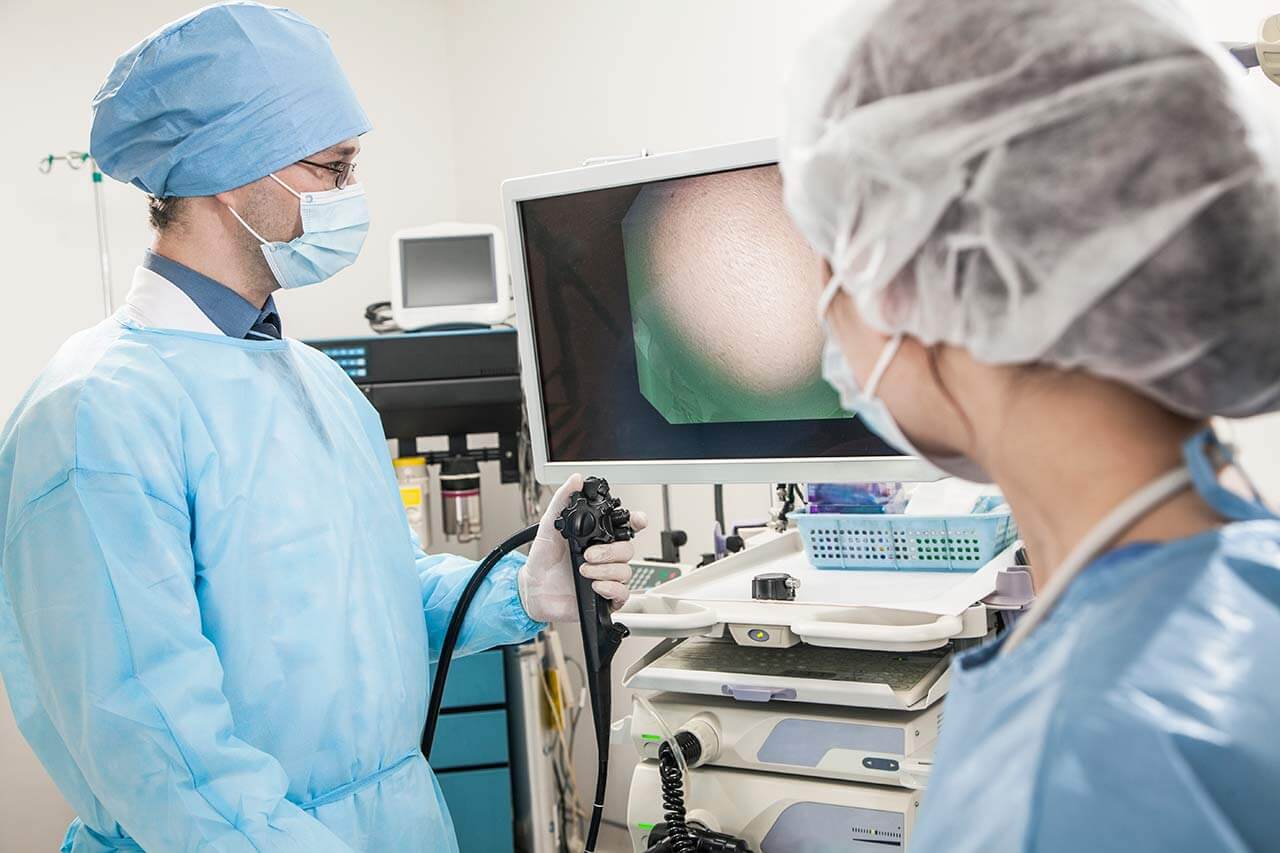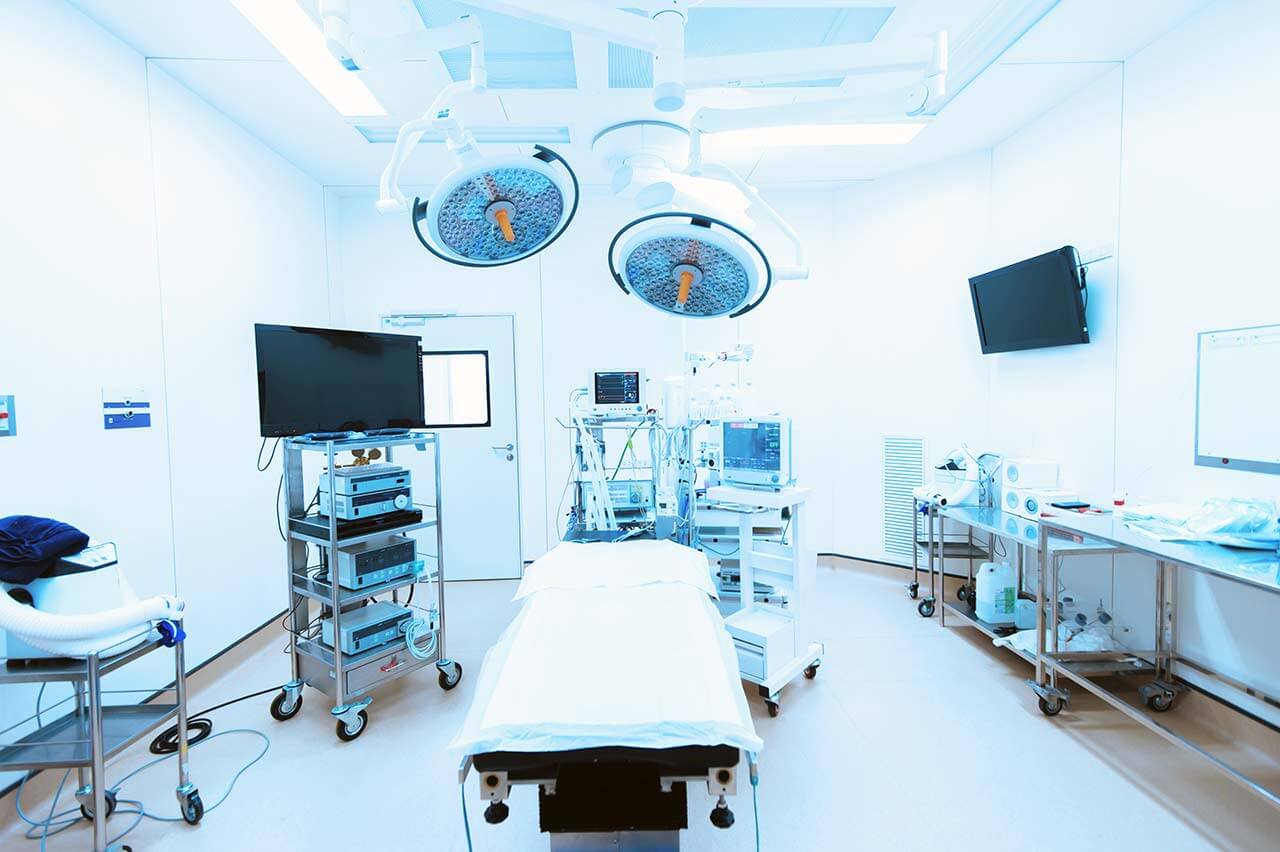
The program includes:
- Initial presentation in the clinic
- clinical history taking
- physical examination
- laboratory tests:
- complete blood count
- biochemical blood analysis
- metabolic analysis of blood
- cardiovascular disease risk markers
- inflammation indicators (CRP, ESR)
- indicators of blood coagulation
- doppler/duplex scanning of lower extremity vessels
- angiography or MRI (on indication 1200 €)
- nursing services
- consultation of all leading experts
- development of individual treatment plan
- written statement
Required documents
- Medical records
- Doppler ultrasound/duplex scanning (if available)
- Angiogram (if available)
Service
You may also book:
 BookingHealth Price from:
BookingHealth Price from:
About the department
The Department of Vascular Surgery at the Luisenhospital Aachen offers the full range of medical services in the field of its competence. The department's team of doctors specializes in the surgical treatment of diseases of the arteries, veins, and lymphatic vessels. Since 2003, the department has been the Center for Vascular Diseases, certified by the German Society of Vascular Surgery (DGG). The department's specialists excel in the surgical treatment of carotid artery stenosis, peripheral arterial occlusive disease, abdominal aortic aneurysms, thoracic aortic aneurysms, deep vein thrombosis, varicose veins, and other pathologies. Eight specialized surgeons and highly qualified nursing staff members take care of the patients' health. The work of the specialists is based on an individual approach to each patient. The department's diagnostic rooms are equipped with state-of-the-art devices for computed tomography, magnetic resonance imaging, digital subtraction angiography, etc. Minor vascular surgical procedures are performed on an outpatient basis, while in complex clinical cases, patients require a hospital stay. The department's surgeons widely practice minimally traumatic endovascular and hybrid techniques, so the risks of complications during surgery or in the postoperative period are practically equal to zero, while the effectiveness of treatment is at a high level. The department is headed by Dr. med. Ulrich Radtke.
The department has accumulated impressive experience in the treatment of carotid artery stenosis. Patients with this pathology often have no complaints, so it is detected during check-ups or diagnostics for other reasons. Carotid artery stenosis is a pathological narrowing of the lumen of the blood vessel due to the formation of atherosclerotic plaques. Pathology significantly increases the risk of a stroke, which may provoke paralysis or even death. In cases of moderate stenosis, the department's vascular surgeons prefer watchful waiting with regular check-ups every 6 months or once a year. However, the specialists diagnose severe carotid artery stenosis if more than 70% of the lumen of the blood vessel is blocked by atherosclerotic plaques, and in such cases, surgery is the best option.
During the preparation for surgery, patients undergo comprehensive diagnostics, including blood tests, ECG, chest X-rays, duplex ultrasound scanning of the carotid arteries, CT, MRI, etc. The department's surgeons have at their command various surgical techniques, but in most cases, they perform eversion carotid endarterectomy. The essence of the intervention is as follows: a surgeon makes a small skin incision on the lateral surface of the neck, after which he separates the affected internal carotid artery from the external, turns it inside out, removes atherosclerotic plaques, and restores the integrity of the vascular wall. The duration of the surgical intervention is 1-2 hours. The operation is performed under local or general anesthesia, depending on the particular clinical case. Patients with recurrent carotid artery stenosis are recommended to undergo endovascular stent implantation.
Another important focus for the department's vascular surgeons is the treatment of peripheral arterial occlusive disease. Pathology is quite common and life-threatening. Patients with this disease have thrombosis or narrowing of the arteries in the lower limbs (in rare cases, the upper limbs may be affected as well), leading to impaired blood flow. The main symptoms include intermittent claudication and severe pain, even at rest. Without treatment, patients are at risk of developing gangrene. The department's vascular surgeons often perform balloon angioplasty with subsequent stent implantation. This treatment option is minimally invasive. The procedure is carried out using catheter-based techniques under general anesthesia. In complex cases, the optimal treatment option is thromboendarterectomy, during which the specialists directly remove atherosclerotic plaques from the affected artery. Good results can also be achieved with the help of bypass surgery, which involves the creation of an alternative blood flow pathway using the patient's own arteries or a vascular graft. When performing thromboendarterectomy and bypass surgery, the department's doctors use hybrid surgical techniques combining classical open surgery and endovascular techniques.
The department's team of surgeons regularly treats patients with thoracic and abdominal aortic aneurysms. An aneurysm is the dilation of a segment of an artery due to the stretching and thinning of its walls. Aneurysms are diagnosed when the diameter of the aorta increases by 2 times or more. The most dangerous complication of an aneurysm is its rupture, which may lead to internal bleeding, necessitating urgent medical intervention and potentially leading to death. The only effective treatment for aneurysms is surgery. Up to 80% of operations for thoracic and abdominal aortic aneurysms are performed in the department using endovascular techniques. The surgeon performs a puncture in the area of the inguinal artery, through which a vascular graft is delivered to the pathological focus. The prosthesis strengthens the vascular wall and restores the normal diameter of the artery.
The department's range of surgical services includes:
- Surgery for carotid artery stenosis
- Eversion carotid endarterectomy
- Endovascular stent implantation
- Surgery for peripheral arterial occlusive disease
- Balloon angioplasty with subsequent stent implantation
- Thromboendarterectomy
- Bypass surgery
- Surgery for thoracic and abdominal aortic aneurysms
- Endovascular and classical (using open surgical techniques) prosthetic repair surgery
- Surgery for deep vein thrombosis
- Venous thrombectomy
- Surgery for varicose veins
- Babcock's stripping procedure
- Foam sclerotherapy
- Endovenous VNUS Closure procedure
- Mini-phlebectomy
- Minor surgery for dialysis access formation and port system placement
- Other medical services
Curriculum vitae
Higher Education
- Medical studies, admission to medical practice, Heinrich Heine University Duesseldorf.
Professional Career
- December 1990 - May 2008 Senior Physician, Department of Vascular Surgery, Evangelical Hospital Muelheim.
- Since May 2008 Head Physician, Department of Vascular Surgery, Luisenhospital Aachen.
Clinical Focuses
- Vascular surgery.
- Phlebology.
- Lymphology.
- Endovascular surgery (certified specialist, German Society of Vascular Surgery (DGG)).
Photo of the doctor: (c) Luisenhospital Aachen
About hospital
The Luisenhospital Aachen is a modern health facility that offers top-class European-standard service. The medical complex is an academic hospital of RWTH Aachen University, which provides patients with access to innovations in diagnosis and treatment. The hospital first opened its doors to patients in 1967 and has been carrying out a successful clinical practice for more than 155 years.
The hospital has 15 specialized departments, each of which employs a team of experienced and competent specialists who prioritize patients' health. The main areas of clinical activity at the hospital are general surgery, abdominal surgery, thoracic surgery, vascular surgery, plastic surgery, gastroenterology, cardiology, endocrinology, gynecology, obstetrics, mammology, traumatology, and orthopedics.
More than 17,000 inpatients and about 37,600 outpatients are treated in the hospital every year. The team of physicians consists of more than 160 specialists, while the nursing staff consists of about 500 employees. It is noteworthy that the hospital's doctors regularly admit patients from abroad, so the hospital has gained unique experience in working with international patients.
The hospital provides patients with all the necessary conditions for maximum comfort. The medical staff strives to surround the patient with care and take into account their individual needs. The basis of the work of the hospital's team lies in its own slogan: "Thorough care for a patient and their needs". The good reputation of the hospital in the European medical arena and the constant growth in the number of people wishing to be treated here are the best evidence of the excellent medical care provided here.
Photo: (с) depositphotos
Accommodation in hospital
Patients rooms
The patients of the Luisenhospital Aachen live in comfortable single and double rooms. The standard patient room furnishings include an automatically adjustable bed, a bedside table with a pull-out tray, a wardrobe, a table, chairs, a TV, and a telephone. Each patient room has an ensuite bathroom with a shower and a toilet.
Patients are also offered accommodation in enhanced-comfort rooms. Such patient rooms have a more sophisticated design and are additionally equipped with a safe, a mini-fridge, and a cozy space with upholstered furniture.
Meals and Menus
Patients in the hospital are offered three tasty and balanced meals a day. Patients have a choice of three set menus, including dietary ones. If, for some reason, you do not eat all the foods, you will be offered an individual menu. Please inform the medical staff about your dietary preferences prior to treatment.
There is a cozy cafe, Caféhaus Luise, on the ground floor of the hospital, where patients can enjoy delicious main courses, snacks, pastries, cakes, and pies. The cafe also offers a wide range of hot and cold drinks. In the warm season, patients can have lunch, snacks, or enjoy a cup of coffee or tea with dessert on the beautiful terrace.
Further details
Standard rooms include:
Religion
The hospital has a special hall where Catholic and Evangelical worship is held every Sunday morning. It is also a place of solitude for prayer on any day and at any time of day.
The services of representatives of other religions are available upon request.
Accompanying person
Your accompanying person may stay with you in your patient room or at the hotel of your choice during the inpatient program.
Hotel
You may stay at the hotel of your choice during the outpatient program. Our managers will support you for selecting the best option.





